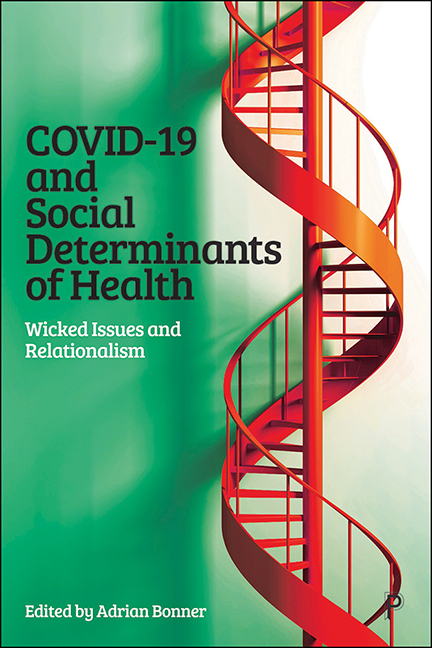Book contents
- Frontmatter
- Miscellaneous Frontmatter
- Contents
- List of figures and tables
- Notes on contributors
- Foreword
- Introduction
- Part I Wicked issues and relationalism
- Part II Regionalism and geopolitical environments
- Part III Public sector, COVID-19 and culture change
- Part IV The third sector
- Part V The case for relationalism
- Part VI Engagement and proposed changes
- Conclusion
- Appendix The Centre for Partnering
- Index
7.3 - Case study: COVID-19 and increased vulnerabilities to human trafficking and modern slavery – perspectives from India and Nepal
Published online by Cambridge University Press: 18 January 2024
- Frontmatter
- Miscellaneous Frontmatter
- Contents
- List of figures and tables
- Notes on contributors
- Foreword
- Introduction
- Part I Wicked issues and relationalism
- Part II Regionalism and geopolitical environments
- Part III Public sector, COVID-19 and culture change
- Part IV The third sector
- Part V The case for relationalism
- Part VI Engagement and proposed changes
- Conclusion
- Appendix The Centre for Partnering
- Index
Summary
Introduction
This case study is an accumulation of our own personal reflections of what we have experienced and observed during the COVID-19 pandemic in our country contexts. We include stories we have gathered from our partners, personal contacts and community members and grey literature (including academic, media reports and journal articles) found through online searches. Responding to modern slavery and human trafficking during this time has never been so difficult. Despite lockdowns implemented in our respective contexts, we have continued responding to modern slavery and human trafficking, as we recognise the urgency and severity it brings in an emergency.
We outline the COVID-19 situation in our countries, followed by some of the consequences of COVID-19 that have made people vulnerable to modern slavery and human trafficking. We describe some new forms of vulnerabilities that are emerging as well as how different organisations are working together to not only tackle the virus but also to reduce vulnerabilities. Finally, we conclude with some key recommendations of responding to modern slavery and human trafficking during a time of crisis.
COVID-19 situation in Nepal and India
There has been much attention on Asia since the COVID-19 virus was discovered in late 2019 in Wuhan City, China (WHO, 2020). Unsurprisingly, the virus spread to neighbouring countries causing a domino effect and eventually a surge in COVID-19 cases globally, establishing a pandemic new to our generation. The first known cases of COVID-19 in South Asia were detected in Nepal on 25 January 2020 and later in India on 30 January 2020, both students, carrying the virus, returning from China to their respective home countries (Andrews et al, 2020; Behal and Mukherjee, 2020). As with the rest of the world, India and Nepal imposed a nationwide lockdown in March 2020 in order to retain the virus and in fear that the health system could collapse if there was a sharp rise in cases. Nepal and India share a ‘long, porous border’ (Aljazeera, 2021a) whereby the government on either side chose to close their doors to both domestic and international visitors.
- Type
- Chapter
- Information
- COVID-19 and Social Determinants of HealthWicked Issues and Relationalism, pp. 133 - 142Publisher: Bristol University PressPrint publication year: 2023



